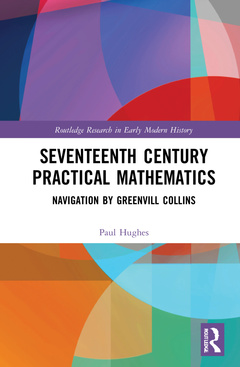Description
Seventeenth Century Practical Mathematics
Navigation by Greenvill Collins
Routledge Research in Early Modern History Series
Language: English
Subject for Seventeenth Century Practical Mathematics:
Keywords
Trinity House; Navy Board; EIC; Sailing Directions; RAC; Deptford Strond; North East Passage; King's Ships; TNA; Prime Meridian; National Library; East Indies; Royal Mathematical School; Small Scale Chart; ADM; Lord High Admiral; Nicolaas Witsen; Barents Sea; Secretary Of State; St George's Channel; Voyage Journals; Front Matter; Davis Quadrant; Back Staff; Duke Of York
Publication date: 05-2023
· 15.2x22.9 cm · Paperback
Publication date: 09-2021
· 15.2x22.9 cm · Hardback
Description
/li>Contents
/li>Biography
/li>
This exciting Greenvill Collins biography is about seventeenth century navigation, focusing for the first time on mathematics practised at sea. This monograph argues the Restoration kings?, Charles II and James II, promotion of cartography for both strategy and trade. It is aimed at the academic, cartographic and larger market of marine enthusiasts. Through shipwreck and Arctic marooning, and Dutch and Spanish charts, Collins evolved a Prime Meridian running through Charles?s capital. After John Ogilby?s successful Britannia, Charles set Collins surveying his kingdom?s coasts, and James set John Adair surveying in Scotland. They triangulated at sea. Subsequently, Collins persuaded James to sustain his dead brother?s ambition. This, the British coast?s first survey took six years. After James?s flight, and William III?s invasion, Collins lead the royal yacht squadron for six years more, garnering funds to publish Great Britain?s Coasting Pilot. The Admiralty and civic institutions subsidised what became his own pilot. Collins aided Royal Society members in their investigations, and his new guide remained vital to navigators through the century following. Charles?s cartographic promotion bloomed the most spectacularly in the atlases of Ogilby, Collins and John Flamsteed for roads, harbours, and stars.
1. Introduction 2. Navigation and seamanship 3. Sailing-master making 4. Sights ashore 5. Curriculum to survey 6. Surveying 7. Dedicatees and subscribers 8. Atlas manufacture 9. Matter bound and unbound 10. Pilot influence 1. Yacht squadron leader 12. Conclusion
With a PhD in engineering the master mariner, Paul Hughes provides marine consultancy to shipping, oil majors and port authorities. His publications in hydrography range from charts and tidal prediction through sailing directions.



